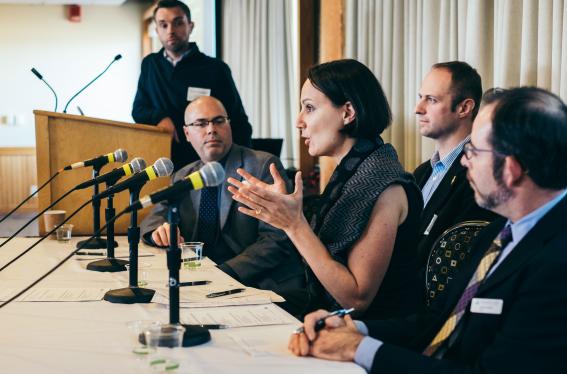Social Entrepreneurship Day 2015: Academic and Practitioner Insights
November 20, 2015
The next frontier of social investment will embrace more lower- and middle- income entrepreneurs. It must attract more early-stage investing and blended capital, observed social impact consultant Bulbul Gupta, who exceled as keynote speaker at Social Entrepreneurship Day.
Coordinated by Isenberg’s Berthiaume Center for Entrepreneurship, the daylong event on November 17th at the Campus Center offered separate panels on global and local entrepreneurship. It featured a third panel that explored financing mechanisms for social entrepreneurs. And it offered a dynamic networking opportunity for entrepreneurs, investors, and academics (including students).
In her remarks, Gupta, a social impact consultant and external director with the data analytics firm, Mission Measurement, emphasized the growing practice of alternative credit scoring and bank financing for entrepreneurs. She also noted the growing impact of sustainable development goals, including climate change solutions that embrace clean tech and renewables.
Financing Social Entrepreneurships

Like the other two panels, Financing Mechanisms in Social Entrepreneurships featured participants from academe and industry. Michael Abbate, COO of Common Capital—a nonprofit, community development financer and trainer of small business entrepreneurs in Western Massachusetts--outlined his organization’s mission, portfolio, and financing methods. He described some of his firm’s success stories and noted, “It is business advisory services that differentiate us.”
Panelist Andrew Bellak, founder and CEO of Stakeholders Capital, an Amherst-based wealth management firm, remarked that 95% of his company’s investments occupy socially responsible terrain. He described a wealth of resources—financial, technical, and mentorships—for the socially responsible entrepreneur. But he cautioned: “Many investors will push to get their money back. And entrepreneurship is romanticized. It’s a lovely American dream to save the world and sometimes it happens. But entrepreneurship is hard; it’s really hard.”
Chloe Le Coq, a behavioral economist and professor at the Stockholm School of Economics, and Bogdan Prokopovych, a lecturer in management at Isenberg, offered academic research perspectives on social entrepreneurship. Le Coq’s current research, which asks social entrepreneurs to complete an application with the prospect of a monetary reward, is attempting to determine their motivations through how they weigh monetary gain versus social impact. It’s critical, she emphasized, to design an application that gauges her subjects’ preferences by observing their behavior.
Establishing metrics for the viability of social entrepreneurship businesses is critical, observed Bogdan Prokopovych. The Isenberg lecturer is researching how organizations with dissimilar value systems team up in mutual social enterprises. He is researching three social enterprises in Sweden—a volunteering platform, a device company, and a service cooperative. By joining forces with partners, each organization, he noted, is gaining a new “status.” To that end, his research is assessing how each organization is protecting its autonomy and is achieving both organizational and mutual gains, including promotion of social missions.